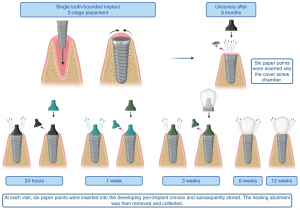Microbial pioneers: how bacteria shape dental implant health from day one
GA, UNITED STATES, May 30, 2025 /EINPresswire.com/ -- A new study suggests that the earliest microbes to colonize a dental implant may determine its long-term fate. Using high-resolution genomic sequencing and a 12-week clinical timeline, scientists tracked how microbial ecosystems form around new dental implants. Rather than a random colonization process, they found that bacteria trapped inside the implant's internal cover screw during surgery play a foundational role in shaping the community. These microbial pioneers not only dominate early but also influence which species arrive later. The findings point to a critical window where interventions could prevent peri-implantitis—a major cause of implant failure affecting millions of patients worldwide.
Dental implants have transformed modern dentistry, yet about 10% ultimately fail due to peri-implantitis—an inflammatory condition caused by microbial imbalance. Unlike natural teeth, implants lack a long evolutionary relationship with the oral microbiome, making them more susceptible to dysbiosis. While bacterial biofilms around implants resemble those on teeth, emerging research shows their development follows a different trajectory. Previous studies using low-resolution methods captured only a snapshot of these early dynamics. As dental implants become more widespread, deeper insight into how their microbial communities originate and evolve is urgently needed. To address these unresolved questions, researchers set out to chronicle the succession of microbial life from the moment of implant exposure.
In a study published in April 2025 in the International Journal of Oral Science, researchers from the University of Michigan and collaborating institutions investigated the microbial colonization of dental implants in 15 healthy adults. Samples were collected over six time points spanning 12 weeks. By combining whole-genome shotgun sequencing with network analysis, the team revealed a non-random, resilient microbial assembly process that begins within the implant itself. The research provides one of the most comprehensive timelines to date of how these hidden ecosystems take shape.
The team found that the primary seeding of the peri-implant microbiome comes from bacteria residing in the implant's internal cover screw chamber. Within 24 hours, species such as Streptococcus mitis and members of the Prevotella genus firmly established themselves and persisted throughout the study. These pioneers served as microbial "hubs", attracting or excluding later arrivals based on phylogenetic similarity—a pattern described as "nepotistic recruitment". In contrast to the more diverse and flexible microbiomes found around natural teeth, the peri-implant community was more deterministic and constrained. Even after disruption from crown placement, the implant microbiome showed striking resilience, returning to its original state within weeks. Functional analysis showed an initial shift toward anaerobic processes but maintained oxygen-dependent activity, underscoring a unique metabolic signature. As time passed, each implant's microbiome diverged further from neighboring teeth, signaling personalized and niche-specific development.
"Our findings challenge the idea that implants simply inherit bacteria from nearby teeth," said Dr. Purnima Kumar, senior author and professor at the University of Michigan. "Instead, we see a structured and stable process that begins with the implant's own microbial residents. This insight opens new possibilities to influence early colonization in ways that support better healing and long-term implant success."
These findings lay the groundwork for novel approaches to peri-implant care. Targeted interventions—such as antimicrobial strategies, probiotic coatings, or microbial "priming" at the time of implant placement—could shape the early community toward health rather than disease. The research also underscores the importance of ensuring periodontal health before implantation, as a single pathogenic strain could seed a harmful community. Looking ahead, scientists may focus on spatial mapping of microbial interactions or developing clinical tools to monitor early colonization. By leveraging our growing understanding of microbial succession, dental care can move from reaction to prevention—ensuring more implants succeed from the start.
References
DOI
10.1038/s41368-025-00367-7
Original Source URL
https://doi.org/10.1038/s41368-025-00367-7
Funding information
This study was supported by National Institutes of Health R03DE027492 to Shareef Dabdoub. Tamires Pereira Dutra is supported by National Institutes of Health, project number 7R01DE027857-06. The sequencing and data analysis was supported by National Institutes of Health R56DE033913 awarded to Purnima Kumar.
Lucy Wang
BioDesign Research
email us here
Legal Disclaimer:
EIN Presswire provides this news content "as is" without warranty of any kind. We do not accept any responsibility or liability for the accuracy, content, images, videos, licenses, completeness, legality, or reliability of the information contained in this article. If you have any complaints or copyright issues related to this article, kindly contact the author above.
Book Brush’s BookMARCon Draws Over 950 Authors in One of the Largest Indie Author Conferences of 2025
Post-Traditional Careers Launches AI-Integrated Learning Ecosystem Achieving 695% Engagement Increase
New Aeration Solution Delivers Natural Whole-Lake Visual Circulation in Texas Field Study
Więcej ważnych informacji
 Jedynka Newserii
Jedynka Newserii

 Jedynka Newserii
Jedynka Newserii

Konsument

Polacy nie korzystają z hossy trwającej na warszawskiej giełdzie. Na wzrostach zarabiają głównie inwestorzy zagraniczni
Od października 2022 roku na rynkach akcji trwa hossa, nie omija ona także warszawskiej giełdy. Mimo to inwestorzy indywidualni odpowiadają zaledwie za kilkanaście procent inwestycji, a o wzrostach decyduje i na nich zarabia głównie kapitał z zagranicy. Widać to również po napływach i odpływach do i z funduszy inwestycyjnych. Zdaniem Tomasza Koraba, prezesa EQUES Investment TFI, do przekonania Polaków do inwestowania na rodzimej giełdzie potrzeba zysków z akcji, informacji o tych zyskach docierającej do konsumentów oraz czasu.
Polityka
Obowiązek zapełniania magazynów gazu w UE przed sezonem zimowym ma zapewnić bezpieczeństwo dostaw. Wpłynie też na stabilizację cen

Unia Europejska przedłuży przepisy z 2022 roku dotyczące magazynowania gazu. Będą one obowiązywać do końca 2027 roku. Zobowiązują one państwa członkowskie do osiągnięcia określonego poziomu zapełnienia magazynów gazu przed sezonem zimowym. Magazyny gazu pokrywają 30 proc. zapotrzebowania Unii Europejskiej na niego w miesiącach zimowych. Nowe unijne przepisy mają zapewnić stabilne i przystępne cenowo dostawy.
Infrastruktura
Gminy zwlekają z uchwaleniem planów ogólnych zagospodarowania przestrzennego. Może to spowodować przesunięcie terminu ich wejścia w życie

Reforma systemu planowania i zagospodarowania przestrzennego rozpoczęła się we wrześniu 2023 roku wraz z wejściem w życie większości przepisów nowelizacji ustawy z 27 marca 2003 roku. Uwzględniono w niej plany ogólne gminy (POG) – nowe dokumenty planistyczne, za których przygotowanie mają odpowiadać samorządy. Rada Ministrów w kwietniu br. uchwaliła jednak ustawę o zmianie ustawy z 7 lipca 2023 roku, a jej celem jest zmiana terminu obowiązywania studiów uwarunkowań i kierunków zagospodarowania przestrzennego gmin na 30 czerwca 2026 roku. Wskazana data może nie być ostateczna z uwagi na to, że żadna z gmin nie uchwaliła jeszcze POG.
Partner serwisu
Szkolenia

Akademia Newserii
Akademia Newserii to projekt, w ramach którego najlepsi polscy dziennikarze biznesowi, giełdowi oraz lifestylowi, a także szkoleniowcy z wieloletnim doświadczeniem dzielą się swoją wiedzą nt. pracy z mediami.









.gif)

 |
| |
| |
|